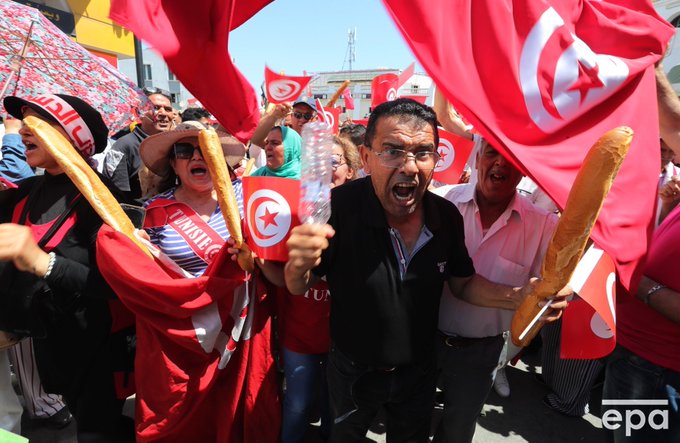Supporters of Tunisia's Free Destourian Party rally against Tunisian President Kais Saied and the holding of the new constitutional referendum on 25 July 2022, in Tunis, Tunisia, 18 June 2022.  epa / Mohamed Messara
#Tunisia #constitution #referendum #epaphotos #epaimages
epa / Mohamed Messara
#Tunisia #constitution #referendum #epaphotos #epaimages
 epa / Mohamed Messara
#Tunisia #constitution #referendum #epaphotos #epaimages
epa / Mohamed Messara
#Tunisia #constitution #referendum #epaphotos #epaimagesSupporters of the Free Destourian Party protest against the Tunisian President outside the Independent High Authority for Elections in the capital Tunis on July 7, 2022. -
Copyright © africanewsYACINE MAHJOUB/AFP or licensors
By Africanews with AFP
TUNISIA
A protest against the upcoming July 25 referendum on President Kais Saied's new constitution has taken place in Tunis.
Some 200 supporters of Tunisia's secular Free Destourian Party gathered outside the electoral commission's headquarters bearing signs reading "we don't trust your results" and "stop this illegal process".
In July last year, Saied sacked the government and froze the parliament dominated by Tunisia's Islamist-inspired Ennahdha party.
He later extended his powers in what critics see as a coup against democracy in the birthplace of the Arab Spring uprisings.
The constitution, the centrepiece of Saied's drive to remake the Tunisian political system, sparked instant criticism for the nearly unlimited power it gives the president.
A 'dictatorial regime'
"The draft that has been presented has been made to measure for Saied, Ennahdha party spokesman Imed Khemeri said.
"This document did not come from the people or from a national dialogue."
The legal expert who headed a committee to draw up the new charter said the final text published by Saied had "nothing to do with the text we drafted and submitted to the president".
The expert, Sadeq Belaid, added that it risked paving the way for a "dictatorial regime", more than a decade after Tunisia's pro-democracy revolt sparked copycat uprisings across the region.
On Tuesday, Saied defended the proposed constitution in an open letter.
He said "this draft was built on what the Tunisian people have expressed from the start of the revolution up until the correction of its path" last July, and that those who worried about it creating a new autocracy hadn't read it properly.
Ennahdha under pressure
Ennahdha, which has dominated Tunisia's politics since the revolt that toppled dictator Zine El Abidine Ben Ali in 2011, has found itself under pressure since Saied's power grab.
A Tunisian court on Tuesday froze the bank accounts of its chief and speaker of the now-dissolved parliament Rached Ghannouchi, as well as his son Mouadh and former prime minister and one-time senior party member Hamadi Jebali, who is accused of money-laundering.
The party urged its supporters on Thursday to boycott the referendum on Saied's new constitution, saying it would "lead to a repressive, authoritarian regime".
"We call for a boycott of the referendum because what is being voted on is not in the interests of Tunisians," Khemeri said.
Around 30 NGOs including the SNJT journalists' union and rights group the LTDH also called for a boycott of the referendum, saying the text was "written by a single person without participation by civil society or experts".
By Africanews with AFP
TUNISIA
A protest against the upcoming July 25 referendum on President Kais Saied's new constitution has taken place in Tunis.
Some 200 supporters of Tunisia's secular Free Destourian Party gathered outside the electoral commission's headquarters bearing signs reading "we don't trust your results" and "stop this illegal process".
In July last year, Saied sacked the government and froze the parliament dominated by Tunisia's Islamist-inspired Ennahdha party.
He later extended his powers in what critics see as a coup against democracy in the birthplace of the Arab Spring uprisings.
The constitution, the centrepiece of Saied's drive to remake the Tunisian political system, sparked instant criticism for the nearly unlimited power it gives the president.
A 'dictatorial regime'
"The draft that has been presented has been made to measure for Saied, Ennahdha party spokesman Imed Khemeri said.
"This document did not come from the people or from a national dialogue."
The legal expert who headed a committee to draw up the new charter said the final text published by Saied had "nothing to do with the text we drafted and submitted to the president".
The expert, Sadeq Belaid, added that it risked paving the way for a "dictatorial regime", more than a decade after Tunisia's pro-democracy revolt sparked copycat uprisings across the region.
On Tuesday, Saied defended the proposed constitution in an open letter.
He said "this draft was built on what the Tunisian people have expressed from the start of the revolution up until the correction of its path" last July, and that those who worried about it creating a new autocracy hadn't read it properly.
Ennahdha under pressure
Ennahdha, which has dominated Tunisia's politics since the revolt that toppled dictator Zine El Abidine Ben Ali in 2011, has found itself under pressure since Saied's power grab.
A Tunisian court on Tuesday froze the bank accounts of its chief and speaker of the now-dissolved parliament Rached Ghannouchi, as well as his son Mouadh and former prime minister and one-time senior party member Hamadi Jebali, who is accused of money-laundering.
The party urged its supporters on Thursday to boycott the referendum on Saied's new constitution, saying it would "lead to a repressive, authoritarian regime".
"We call for a boycott of the referendum because what is being voted on is not in the interests of Tunisians," Khemeri said.
Around 30 NGOs including the SNJT journalists' union and rights group the LTDH also called for a boycott of the referendum, saying the text was "written by a single person without participation by civil society or experts".
VIDEO
https://www.africanews.com/embed/1992188

No comments:
Post a Comment